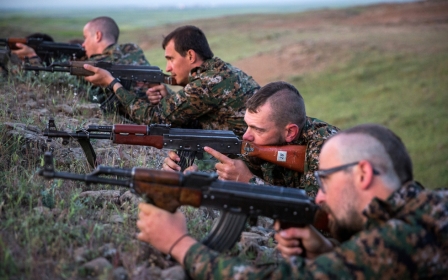British YPG fighters 'head to Manbij to face Turkish forces'

A brigade of British volunteers fighting with a US-backed Kurdish militia in northern Syria say they are planning to oppose advances by Turkish-backed forces, a day after senior Turkish officials said all would be confronted as "terrorists".
In a series of statements on Twitter on Friday, the Bob Crow Brigade said that its members were leaving the Raqqa front, where they had been fighting the Islamic State (IS) group, to travel to Manbij, a town in northern Aleppo that the YPG took from IS last month, and where pro-Turkish forces now are massing.
Those forces include thousands of members of the Free Syrian Army (FSA) trained in Turkey.
The statement comes a day after Turkish officials told Middle East Eye that British and foreign fighters allied with the YPG and its umbrella organisation, the Syrian Democratic Forces (SDF), were considered part of a "terrorist organisation", had a "crusader" mentality and would be treated no differently in combat than local Kurdish fighters.
The brigade's statement said: "This 'FSA' is now 11km from Manbij which the SDF lost almost 500 lives liberating from ISIS for real.
"They want to 'take it back' from us. 'Take it back' for whom? There are no 'moderate rebels' locally outside the YPG-led SDF. Certainly not ones backed by Turkey.
"When we came to defend the revolution we meant from all enemies, big or small. We are leaving the Raqqa front and heading to Manbij."
The Turkish army entered Syria last week, supporting rebels from the Free Syrian Army in their incursion into the IS-held border town of Jarabulus. Since then the Turkish forces and their allies have clashed with fighters from the YPG, which it says is closely linked to its long-time internal foe, the PKK.
Turkish forces have moved closer towards Manbij and ordered all remaining Kurdish fighters to leave or face the consequences.
Turkey has said that it will not allow YPG forces to control any area west of the Euphrates river, which would allow for a contiguous "terrorist corridor" that would link up Syrian areas under Kurdish control along its southern border.
In its statement, the brigade claimed that members of the Turkish-backed FSA were part of IS, a fact that explained the ease of their victory in Jarabulus.
Turkey denies allegations that it has supported IS, and has suffered several large-scale attacks in Istanbul and Ankara in the past year.
Ankara has repeatedly told the YPG to leave areas west of the Euphrates and rejected a truce offer brokered by the US earlier this month.
On Thursday, Yunus Akbaba, an adviser to the Turkish prime minister, told MEE: "Turkey does not differentiate on the basis of nationality when it comes to membership in terrorist organisations.
"In the heat of battle we are not going to stop and ask the terrorists what their nationality is.
“Turkey will not hesitate to confront terrorist organisations within the scope of its operation. These are terrorist groups and anyone fighting under their banner will be considered terrorists,” he said.
“It is the responsibility of the countries where they come from to prevent them from joining these groups. Turkish forces will confront them if they are fighting under the banner of terrorist groups, regardless of whether they are members of allied countries,” he said.
The British foreign office declined to comment directly on the Turkish statement, instead pointing MEE to long-standing advice telling all British nationals to leave Syria as soon as possible.
Stay informed with MEE's newsletters
Sign up to get the latest alerts, insights and analysis, starting with Turkey Unpacked
Middle East Eye delivers independent and unrivalled coverage and analysis of the Middle East, North Africa and beyond. To learn more about republishing this content and the associated fees, please fill out this form. More about MEE can be found here.





